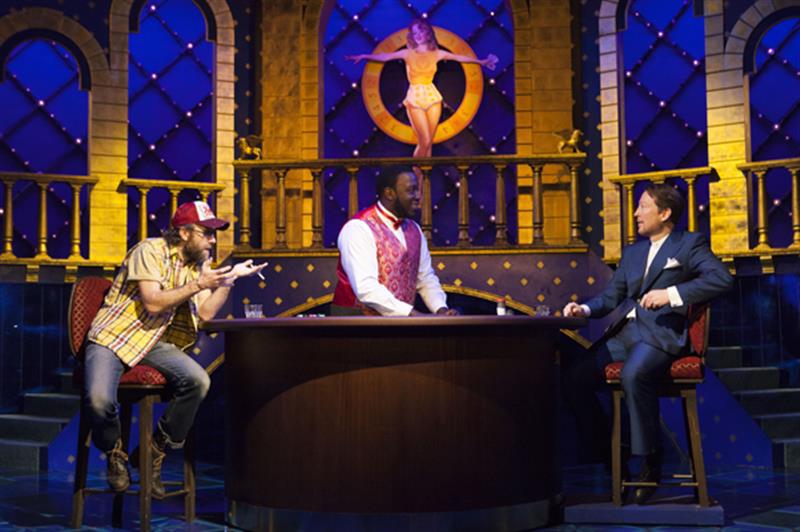By Mary Grace Nguyen
 Richard III is about blood spill and a tragedy amongst
the monarchy. Key themes like death and treachery of Shakespeare’s own Macbeth
come to mind and with direction from Charlotte Ive of the Scrawny Cat Theatre
Company only a small but unique presentation of Richard III is to be expected.
Richard III is about blood spill and a tragedy amongst
the monarchy. Key themes like death and treachery of Shakespeare’s own Macbeth
come to mind and with direction from Charlotte Ive of the Scrawny Cat Theatre
Company only a small but unique presentation of Richard III is to be expected.
On a small stage overseeing the pit and courtyard of
the original Rose theatre, the audience look onto a wooden stage with what
looks like a black robe with a hand made metal crown and arm. Already the
atmosphere is ominous. Jackets, satchels, cloths, and hats of different colours
hang on the side and it is only 4 actresses, Rosemary Tross,
Charley Willow, Victoria Allies and Marie Rabe who are left to demystify a
condensed (90 minute) version of Richard III.
Dressed like Shakespeare himself with 15th century cavalry boots and white-laced blouses
the actresses manage to play 20-30 roles seamlessly by putting on clothes and taking off clothes in a quick and snappy
pace. The stage is a fast moving one with hats and satchels being thrown at
each other to be on cue for the next character. No one is Richard and no one is Lady Anne. The actresses play everyone and this is what makes the play even
more interesting as it is almost like a teasing guessing game encouraging the
audience to ask, who will play Richard next?

Ive’s production is a
refreshing take on Shakespeare but not one for a passive audience. There are dynamic
interactions, movements and quick changes into characters that an attentive viewer
must listen and look out for. Noticing the change in voice and change in
personality is tough but surprisingly these actresses pull it off considering
the constraints and challenges of being in a play with no intervals or scenery changes. Also, Elizabeth Graham’s sorrowful singing added enough atmosphere
to suggest the gloom of Richard III in a dark lit theatre proving that good theatre can be made
by a handful of artistic people.
Particular scenes with
great talent include Allies and Rabe showing the audience four characters at the
same time with the help of Jo Lakin’s puppets. From Richard and Buckingham
to two high-pitched young princes, one could tell it was not an easy job learning all those lines but successfully executed it without confusion or mistakes.
Other interesting
scenes included Willow’s conniving and seductive Richard whilst trying to win
over Rabe’s interpretation of an innocent and ‘puppy eye’ Lady Anne. Tross’ representation
of an anxious and paranoid Richard in the final act dwelling over the array
of souls he's murdered is so woeful that is it almost sympathetic.
Little is known about the Rose theatre (1587), but
given its current condition of being under construction, presented with red rope lights indicating a pit and courtyard, it is not at an optimum state to show what it is fully capable of.
Once a center stage for Marlowe’s
Doctor Faustus, Shakespeare’s Henry VI and Titus Andronicus as a fifth
purpose-built theatre in what was once one of London’s most attractive area for
the underworld (of brothels, gaming dens and bull/bear- baiting arenas,) it was
overtaken by the popular theatres, the Swan (1595) and the Globe (1599) and
eventually abandoned. However, it was discovered again in 1989 during a site
clearance and re-development project, which leaves us with a theatre reviving
itself from the rubble.

Ive
asks us to consider who was Richard III besides the obvious, ‘notorious
villain, child murderer, hated despot’ but there is little to sway our mind.
Richard was the lowest of low - A spiteful and ruthless king. How the 4
actresses portrayed him mattered very little to the audience. As the play
progressed and Richard's character was played in different guises, the audience
learnt to despise Richard more and more. "A horse, a horse, my kingdom for
a horse!" is a significant quote as Richard's last dying words in the
play. As Patroclus would say in Shakespeare’s play 'Troilus and Cressida', I
say Good riddance!

























